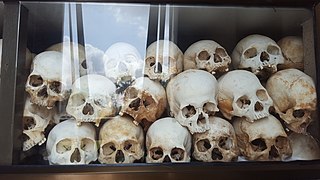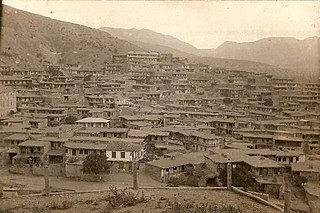Related Research Articles

Democide refers to "the intentional killing of an unarmed or disarmed person by government agents acting in their authoritative capacity and pursuant to government policy or high command." The term was first coined by Holocaust historian and statistics expert, R.J. Rummel in his book Death by Government, but has also been described as a better term than genocide to refer to certain types of mass killings, by renowned Holocaust historian Yehuda Bauer. According to Rummel, this definition covers a wide range of deaths, including forced labor and concentration camp victims, extrajudicial summary killings, and mass deaths due to governmental acts of criminal omission and neglect, such as in deliberate famines like the Holodomor, as well as killings by de facto governments, for example, killings during a civil war. This definition covers any murder of any number of persons by any government.

Genocide is violence that targets individuals because of their membership of a group and aims at the destruction of a people.

Population transfer or resettlement is a type of mass migration that is often imposed by a state policy or international authority. Such mass migrations are most frequently spurred on the basis of ethnicity or religion, but they also occur due to economic development. Banishment or exile is a similar process, but is forcibly applied to individuals and groups. Population transfer differs more than simply technically from individually motivated migration, but at times of war, the act of fleeing from danger or famine often blurs the differences.

Cultural genocide or culturicide is a concept described by Polish lawyer Raphael Lemkin in 1944, in the same book that coined the term genocide. The destruction of culture was a central component in Lemkin's formulation of genocide. Though the precise definition of cultural genocide remains contested, the United Nations does not include it in the definition of genocide used in the 1948 Genocide Convention. The Armenian Genocide Museum defines culturicide as "acts and measures undertaken to destroy nations' or ethnic groups' culture through spiritual, national, and cultural destruction", which appears to be essentially the same as ethnocide. Some ethnologists, such as Robert Jaulin, use the term ethnocide as a substitute for cultural genocide, although this usage has been criticized as risking the confusion between ethnicity and culture. Cultural genocide and ethnocide have in the past been utilized in distinct contexts. Cultural genocide without ethnocide is conceivable when a distinct ethnic identity is kept, but distinct cultural elements are eliminated.

Ethnic cleansing is the systematic forced removal of ethnic, racial, or religious groups from a given area, with the intent of making the society ethnically homogeneous. Along with direct removal such as deportation or population transfer, it also includes indirect methods aimed at forced migration by coercing the victim group to flee and preventing its return, such as murder, rape, and property destruction. Both the definition and charge of ethnic cleansing is often disputed, with some researchers including and others excluding coercive assimilation or mass killings as a means of depopulating an area of a particular group.
Mass killing is a concept which has been proposed by genocide scholars who wish to define incidents of non-combat killing which are perpetrated by a government or a state. A mass killing is commonly defined as the killing of group members without the intention to eliminate the whole group, or otherwise the killing of large numbers of people without a clear group membership.

From 1930 to 1952, the government of the Soviet Union, on the orders of Soviet leader Joseph Stalin and under the direction of the NKVD official Lavrentiy Beria, forcibly transferred populations of various groups. These actions may be classified into the following broad categories: deportations of "anti-Soviet" categories of population, deportations of entire nationalities, labor force transfer, and organized migrations in opposite directions to fill ethnically cleansed territories. Dekulakization marked the first time that an entire class was deported, whereas the deportation of Soviet Koreans in 1937 marked the precedent of a specific ethnic deportation of an entire nationality.

Ethnocide is the extermination or destruction of ethnic identities. Bartolomé Clavero differentiates ethnocide from genocide by stating that "Genocide kills people while ethnocide kills social cultures through the killing of individual souls". According to Martin Shaw, ethnocide is a core part of physically violent genocide. Some substitute cultural genocide for ethnocide, and other argue the distinction between ethnicity and culture. Cultural genocide and ethnocide have been used in different contexts. While the term "ethnocide" and "ethnic cleansing" are similar, the intentions of their use vary. The term "ethnic cleansing" has been criticized as a euphemism for genocide denial, while "ethnocide" tries to facilitate the opposite.

The Anyuak, also known as Anyuaa and Anywaa, are a Luo Nilotic ethnic group inhabiting parts of East Africa. The Anuak belong to the larger Luo family group. Their language is referred to as Dha-Anywaa. They primarily reside in the Gambela Region of western Ethiopia, and South Sudan. Group members number between 200,000 and 300,000 people worldwide. Many of the Anyuak people now follow Christianity. It is one of the first of the Nilotic groups to become almost entirely Christian, following the Shilluk people.

The Greek genocide, which included the Pontic genocide, was the systematic killing of the Christian Ottoman Greek population of Anatolia, which was carried out mainly during World War I and its aftermath (1914–1922) – including the Turkish War of Independence (1919–1923) – on the basis of their religion and ethnicity. It was perpetrated by the government of the Ottoman Empire led by the Three Pashas and by the Government of the Grand National Assembly led by Mustafa Kemal Atatürk, against the indigenous Greek population of the Empire. The genocide included massacres, forced deportations involving death marches through the Syrian Desert, expulsions, summary executions, and the destruction of Eastern Orthodox cultural, historical, and religious monuments. Several hundred thousand Ottoman Greeks died during this period. Most of the refugees and survivors fled to Greece. Some, especially those in Eastern provinces, took refuge in the neighbouring Russian Empire.
Political cleansing of a population is the elimination of categories of people in specific areas for political reasons. The means may vary and include forced migration, ethnic cleansing and population transfers.
Social cleansing is social group-based killing that consists of the elimination of members of society who are considered "undesirable", including, but not limited to, the homeless, criminals, street children, the elderly, the poor, the weak, the sick, the needy and the disabled. This phenomenon is caused by a combination of economic and social factors, but killings are notably present in regions with high levels of poverty and disparities of wealth. Perpetrators are usually of the same community as the victims and they are often motivated by the idea that the victims are a drain on the resources of society. Efforts by national and local governments to stop these killings have been largely ineffective. The government and police forces are often involved in the killings, especially in Africa, Asia, and South America.

Ethnic cleansing occurred during the Bosnian War (1992–95) as large numbers of Bosnian Muslims (Bosniaks) and Bosnian Croats were forced to flee their homes or were expelled by the Army of Republika Srpska and Serb paramilitaries. Bosniaks and Bosnian Serbs had also been forced to flee or were expelled by Bosnian Croat forces, though on a restricted scale and in lesser numbers. The UN Security Council Final Report (1994) states while Bosniaks also engaged in "grave breaches of the Geneva Conventions and other violations of international humanitarian law", they "have not engaged in "systematic ethnic cleansing"". According to the report, "there is no factual basis for arguing that there is a 'moral equivalence' between the warring factions".
Classicide is a concept proposed by sociologist Michael Mann to describe the deliberate and systematic destruction, in whole or in part, of a social class through persecution and violence. Although it was first used by physician and anti-communist activist Fred Schwarz in 1972, classicide was popularized by Mann as a term that is similar to but distinct from genocide because it means the "intended mass killing of entire social classes." Classicide is considered a form of "premeditated mass killing", which is narrower than genocide, because the target of a classicide is a part of a population which is defined by its social status, and classicide is also considered broader than politicide because the group which is targeted for classicide is killed without any concern for its political activities.
The persecution of Eastern Orthodox Christians is the religious persecution which has been faced by the clergy and the adherents of the Eastern Orthodox Church. Eastern Orthodox Christians have been persecuted during various periods in the history of Christianity when they lived under the rule of non-Orthodox Christian political structures. In modern times, anti-religious political movements and regimes in some countries have held an anti-Orthodox stance.

Demographic engineering is deliberate effort to shift the ethnic balance of an area, especially when undertaken to create ethnically homogeneous populations. Demographic engineering ranges from falsification of census results, redrawing borders, differential natalism to change birth rates of certain population groups, targeting disfavored groups with voluntary or coerced emigration, and population transfer and resettlement with members of the favored group. At an extreme, demographic engineering is undertaken through genocide. It is a common feature of conflicts around the world.

The 1914 Greek deportations was the forcible expulsion of around 150,000 to 300,000 Ottoman Greeks from Eastern Thrace and the Aegean coast of Anatolia by the Committee of Union and Progress that culminated in May and June 1914. The deportations almost caused war between Greece and the Ottoman Empire and were an important precursor to the Armenian genocide.

Below is an outline of articles on the academic field of genocide studies and subjects closely and directly related to the field of genocide studies; this is not an outline of acts or events related to genocide or topics loosely or sometimes related to the field of genocide studies. The Event outlines section contains links to outlines of acts of genocide.
References
- 1 2 3 Andrew Bell-Fialkoff, Ethnic Cleansing, Macmillan, 1999, ISBN 0312223366,p. 3
- 1 2 Carrie Booth Walling, "The History and Politics of Ethnic Cleansing", In: Booth, Ken (2012). The Kosovo Tragedy: The Human Rights Dimensions. London: Routledge. p. pp.49-51. ISBN 978-1-13633-476-4.
- ↑ Henry George Liddell, Robert Scott, A Greek-English Lexicon ἀνδράποδον
- 1 2 Mogens Herman Hansen, "The Hellenic Polis", In: A Comparative Study of Thirty City-state Cultures: An Investigation, p. 150